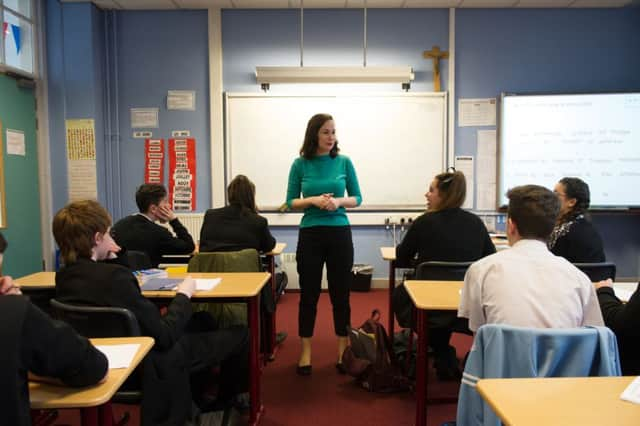Leaders: Firm decision to help pupil performance


When she addressed education leaders in Edinburgh’s Wester Hailes estate last month, the First Minister could not have been clearer.
Announcing the return of standardised testing for primary pupils, she said she wanted to put her “neck on the line” on closing the schooling gap between rich and poor areas.
Advertisement
Hide AdAdvertisement
Hide AdFleshing out the details of the new national testing regime at Holyrood yesterday, she said that improving attainment in Scotland’s schools was “arguably the single most important objective” in her programme for the next year.
A dozen years after national testing was ditched by the Labour-Liberal Democrat coalition led by Jack McConnell, it has been revived by Ms Sturgeon.
Assessments focused on literacy and numeracy are to be piloted in 2016 and introduced in all schools in 2017.
The aim of the tests for pupils in primaries one, four and seven, and in S3 is clear: to gather much more information about the performance of pupils.
Ms Sturgeon has been publicly mulling over such a change since the beginning of the year, when she said new tests may have to be introduced to close the gulf between the best- and worst-performing schools.
But her thoughts may have crystallised in April when the Scottish Survey of Literacy and Numeracy revealed a slump in standards of literacy in primary and secondary schools since 2012. The figures emerged in the wake of the introduction of the Curriculum for Excellence, which was intended to improve standards.
Separate research has found that only 3.9 per cent of pupils in Scotland’s most deprived communities are able to secure three or more Higher A grades.
There have already been fears expressed by Scotland’s largest teaching union, the EIS, and local authority umbrella group Cosla that data from the new tests could be used to compile school league tables, piling further pressure on under-performing pupils and teachers.
Advertisement
Hide AdAdvertisement
Hide AdHowever, the First Minister has insisted some form of standardised assessment is needed to provide a “clear, consistent picture of progress”.
With both Labour and the Scottish Conservatives – who have harshly criticised the SNP’s eight-year record on education – calling for the return of national testing, it will not have been an easy decision for her to approve the new regime.
As a statement of intent for her time in office, it is an impressive start in the face of some fairly damning evidence.
But it may be some time before we will know whether her twin aims – of raising attainment levels and closing that gap – have been met.
Festivals trust could break impasse
The dust has hardly settled on this year’s record-breaking Edinburgh festivals season, which appears to have surpassed all reasonable expectations. But the future funding of the city’s main events is set to exercise minds long after the last performers have gone.
The blizzard of statistics released from the various box offices on Monday has perhaps masked widespread uncertainty about what the future may hold.
Fergus Linehan, the new director of the Edinburgh International Festival, summed things up when he reflected that the city is basking in a “golden age” for its events when it is facing a difficult time for its future finances.
It is worth recalling that public funding of the festivals comes to a mere £10 million, from the city council, Creative Scotland and the Scottish Government. The return was estimated at £261m in 2011, since when there has been a huge expansion of the Fringe.
Advertisement
Hide AdAdvertisement
Hide AdThe idea of a festival tax to help the city recoup some of the income generated during August is not new. Indeed, it has been rejected on several occasions by SNP ministers and has failed to win backing from the hotel industry. But the council raised the prospect again last month as it warned of a “really difficult balancing act” when it is facing cuts of £120m.
What has not been suggested, until now, is that the administration of such a scheme is taken out of the hands of the council and into a new independent trust. If such a body could include representatives of the business and tourism sectors, as well as cultural organisations, the long-standing impasse may just be broken.